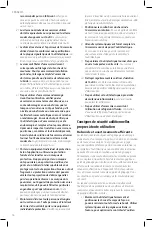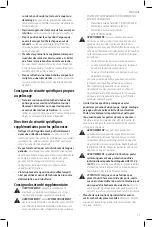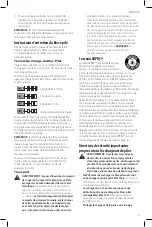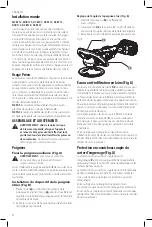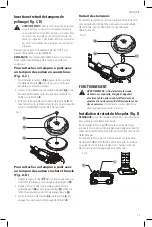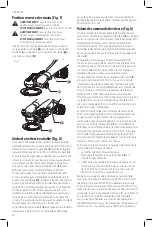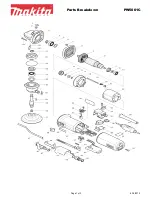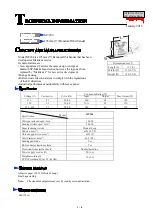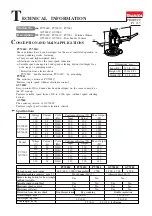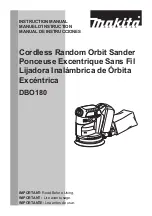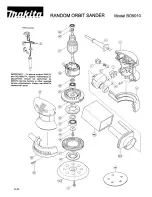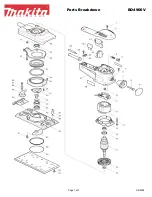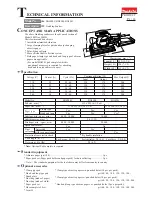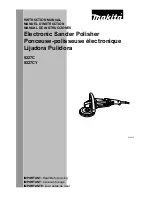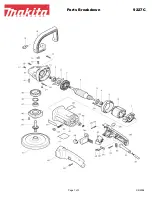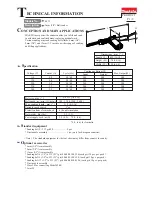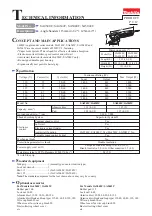
9
English
Fig. C
15
14
16
Attaching and Removing Polishing Pads
(Fig. C, D)
WARNING:
To reduce the risk of serious personal
injury, do not allow any loose portion of the polishing
bonnet or its attachment strings to spin freely. Tuck
away or trim any loose attachment strings.
Loose and
spinning attachment strings can entangle your fingers
or snag on the workpiece.
Polishing pads with a diameter of 7" (180 mm) may be used
with the MCM849.
nOTE:
The MCM849 may use either type of polishing pad
assembly described below.
To Attach Polishing Pad with Rubber
Backing Pad (Fig. A, C)
1. To attach polishing pad
14
, push the hub of the clamp
washer
15
through the hole in the center of the
polishing pad as far as it will go.
2. Engage the hexagonal hole in the backing pad
16
.
Holding the three pieces firmly together, place the
assembly on the tool spindle
8
.
3. Hold the spindle lock button
6
while turning the pads
clockwise to thread them completely on the spindle.
Soft Rubber Gear Case Cover (Fig. A)
The soft rubber gear case cover
9
is designed to eliminate
metal gear case scuffs on painted or polished surfaces.
The soft rubber gear case cover can be removed if required.
To take off the cover, remove the three mounting screws
and lift the cover over the gear case.
Your tool may come with a soft rubber gear case cover. The
soft rubber gear case cover is available at extra cost from
your local dealer or authorized service center.
Wool Ingestion Shields (Fig. A)
The wool ingestion shields
10
are designed to reduce the
amount of wool, dust, and debris that gets ingested by the
motor during normal use. The goal of the ingestion shields
is to improve durability as compared to a unit without the
ingestion shields.
Each ingestion shield can be easily removed for cleaning by
slipping a finger or coin underneath the removal recess and
pulling to release the cover.
The wool ingestion shields can be cleaned with soap and
water and a soft bristle brush in the event they get clogged
with polish and debris. Clean the shields as soon as you start
to see buildup on the outside.
Fig. B
12
13
Your tool may come with a set of wool ingestion shields.
The wool ingestion shields are available at extra cost from
your local dealer or authorized service center.
Handles
Attaching Auxiliary Handle (Fig. A)
WARNING:
Before using the tool, check that the
handle is tightened securely.
Screw the auxiliary handle
7
tightly into one of the holes
on either side of the gear case. The auxiliary handle should
always be used to maintain control of the tool at all times.
Installation of the Bail Handle Assembly
(Fig B)
1. Place the bail handle
12
over the polisher gear case
aligning the screws
13
with the threaded holes and
the ears on the gear case with the slots in the bail
handle assembly.
2. Tighten the screws with the supplied hex wrench to
secure the handle to the polisher.
Adjustment of the Bail handle Angle (Fig. B)
1. Loosen both screws
13
2 full turns.
2. Rotate the bail handle
12
to the desired 45
˚
or 90
˚
position making sure that the detent groves align.
3. Re-tighten the screws to secure the handle to
the polisher.
ASSEMBLY AND ADJUSTMENTS
WARNING: To reduce the risk of serious personal
injury, turn unit off and remove the battery pack
before making any adjustments or removing/
installing attachments or accessories.
An
accidental start-up can cause injury.


















